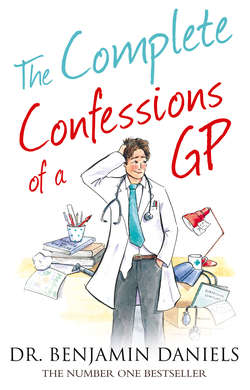Читать книгу The Complete Confessions of a GP - Benjamin Daniels - Страница 17
Drug reps
ОглавлениеSixteen tablets of a supermarket’s own brand ibuprofen cost just 35p, while 16 tablets of Neurofen cost £1.99. This is strange to believe considering they really are exactly the same medicine. The drug company that makes Neurofen uses clever advertising and packaging to convince us to pay over five times more money than we need to.
Drug companies are very good at overcharging us for medicine. In the world of prescription drugs, millions of pounds are wasted by the NHS because doctors prescribe expensive ones when they could be prescribing much cheaper versions of exactly the same medicines. How do the pharmaceutical companies hoodwink us into doing that? Again, it is all about marketing. Young and attractive drug reps come and promote their drugs, while buying us lunch or even taking us out for dinner at posh restaurants. They feed us biased information on why we should use their more expensive medicine and give us free pens and mugs sporting their brand. (There are now much stricter rules than there used to be about how much drug reps can spend on us doctors. For example, the free gifts that they give us now have to be under the value of £5 and when drug reps take us all out for a slap-up meal, there has to be an ‘educational’ component to the evening rather than a completely uninterrupted session of good food and expensive wine. The drug companies’ all-expenses-paid trips to ‘conferences’ in the Caribbean have stopped, too.)
I used to attend the lunches and dinners. As I pocketed the free gifts and scoffed down the expensive nosh, I convinced myself that we doctors were too ‘savvy’ to be influenced by colourful flip charts and pretty smiles. The pharmaceutical industry, of course, knows that this isn’t the case. A few hundred quid taking some GPs out for dinner is peanuts compared to the money they can make if one or two of us start prescribing their drug.
In the USA, pharmaceutical companies employ ex-American football players and cheerleaders to sell their products. Doctors are suckers for a pretty face like everyone else. The attractive female reps are sent to sell their products to the predominantly male surgical consultants, while the pretty-boy male reps sell to the more female-dominated obstetric and paediatric departments. Fortunately in this country, our retired sports stars tend to fall ungracefully into alcoholism and gambling addiction rather than trying to sell us overpriced medicines. I can’t imagine even the most star-struck doctor being convinced to prescribe an antidepressant promoted by Gazza or a painkiller endorsed by Vinnie Jones.
As well as constant pressure from drug reps, GPs also face resistance from patients when trying to change medication. Whenever I can, I try to switch my patients from the more expensive medicines to the cheaper ones that do the same thing. Unfortunately, this can be very unpopular with patients. Often they get used to a certain packet and tablet colour and no amount of persuasion will convince them to switch. One elderly lady once stormed into my surgery furious that I had changed her medicine:
‘You told me that the new medicine was the same as the old one!’
‘Yes that’s right, Mrs Goodson – same medicine, but different name.’
‘Well, I know that’s nonsense because when I try to flush these tablets down the toilet, they don’t float like the old ones did.’
Drug reps have the cheek to claim that they are helping to educate us by updating us on the latest scientific research. This is, of course, nonsense as their only interest is flogging their drug and earning a commission if prescribing rates of their drug increase on their patch. They give ruthlessly one-sided presentations that show their pill to be wonderful and ignore the parts of the research that don’t paint their drug so favourably.
Having finally realised that I will only ever get biased information from the pharmaceutical industry, I now refuse to see any drug reps. They hover around the reception desk like prowling hyenas, only to be batted away by the fierce receptionist. Not having the time or inclination to read all the medical journals myself, I rely on the local NHS pharmacist to keep me up to date with the new medications on the market. She is a fount of knowledge on all the latest scientific research and doesn’t work on commission. Like me, she has the best interest of the patient at heart, while also keeping half an eye on the NHS budget. There really is no such thing as a free lunch and so I’ll pay for my own, thanks.
